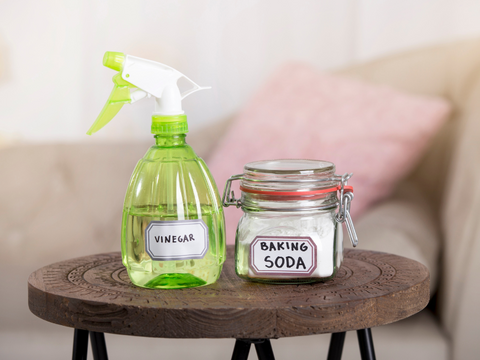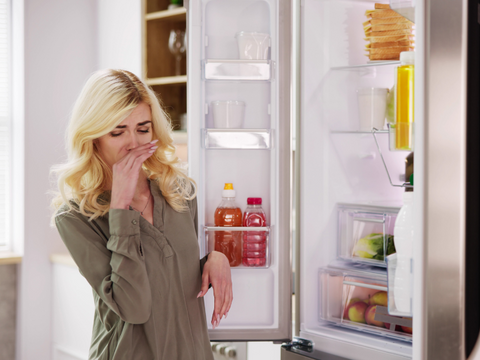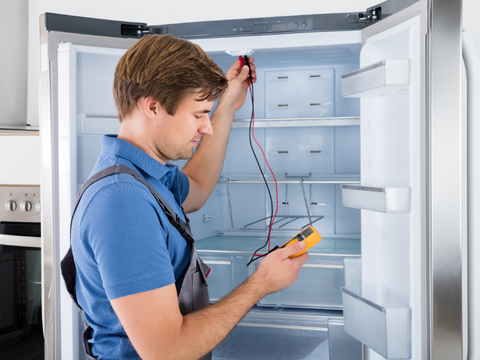A moldy refrigerator is one of those unpleasant problems in the kitchen. We're not talking about moldy cheese or yogurt (although those things are certainly gross). We're talking about mature mold growing on the shelves and walls of your refrigerator. In short: It's not ideal, and you don't want mold in your refrigerator. Next, we’ll discuss the causes of refrigerator mold, how to deal with it, whether it’s dangerous, and how to prevent it.
Steps to remove refrigerator mold:
Remove all removable shelves and drawers (to make cleaning easier) and spray them with undiluted white vinegar. Let the pieces sit for a few minutes while you spray the inside of the refrigerator. Be sure to clean every nook and cranny to ensure a thorough clean.
Wipe surfaces with a damp cloth, then wipe with a clean damp cloth, and finally dry all surfaces. Repeat this step as needed and be sure to discard any paper towels that come into contact with the mold and wash any damp cloths that come into contact with the mold (use hot water and detergent!).
Check the rubber seal around the refrigerator door. If mold is present, you can remove it by using 1 tablespoon of chlorine bleach mixed with 1 quart of water. If desired, you can also add a box of baking soda or lemon wedges for extra deodorizing effect.

How does mold in the refrigerator occur?
The most common source of mold in your refrigerator is rotten food. Typically, you can throw away the food, but mold can spread through the air and surface contact. Therefore, spores on moldy cheese can spread through air circulation or by landing on the shelf where they reside. Remember, the refrigerator is dark most of the time and mold loves the dark! Mold may also develop if the refrigerator is left unplugged for an extended period of time (such as when the power is out for several days). Or, if your refrigerator has mechanical problems, mold may develop (mold will continue to appear even if you clean the inside of the refrigerator). If you think this may be a mechanical issue, you can have an appliance professional take a look to make sure your refrigerator is operating properly.

Is mold in the refrigerator dangerous?
Mold in your refrigerator not only creates an unpleasant visual problem, it can also have health consequences. Let’s take a closer look at the dangers of mold and how to effectively clean a moldy refrigerator.
Allergic Reactions: Mold spores may cause allergic reactions, especially in people with mold allergies. These reactions may include sneezing, runny nose, itchy skin, etc. Anaphylaxis may be more severe in people with weakened immune systems, such as older adults, infants, or people with chronic medical conditions.
Produces toxins: Certain molds, such as black mold ( Stachybotrys Chartarum ), produce toxins. These toxins can have negative effects on human health, including respiratory problems, headaches, fatigue, skin irritation and other symptoms. Although most molds do not produce toxins, they still need to be treated with caution.
Spread: Mold can spread through the air and affect the entire home. If you have mold in your refrigerator, it can spread to other areas through food, dishes, or other items.
Prevention and cleaning methods
After understanding the dangers of mold, let’s take a look at how to prevent and clean mold in the refrigerator:
Clean regularly: Clean the inside of your refrigerator regularly, including the shelves, drawers, and seals. Use mild soapy water or white vinegar to wipe down the surface to make sure the mold is completely removed.
Keep it Dry: Mold loves moist conditions. Make sure the inside of the refrigerator is kept dry to avoid the accumulation of food particles and water droplets.
Check your food: Check your food regularly, especially perishable foods. If you notice spoiled or moldy food, throw it away immediately.
Fix mechanical problems: If your refrigerator has mechanical problems, such as unstable temperatures, broken seals, or a faulty compressor, get it fixed as soon as possible. This will help prevent mold growth.

Good ventilation: Make sure there is adequate ventilation around the refrigerator to reduce the build-up of moisture and mold.
In summary, keeping your refrigerator clean, dry, and inspected regularly can help you effectively prevent and deal with mold problems.
























